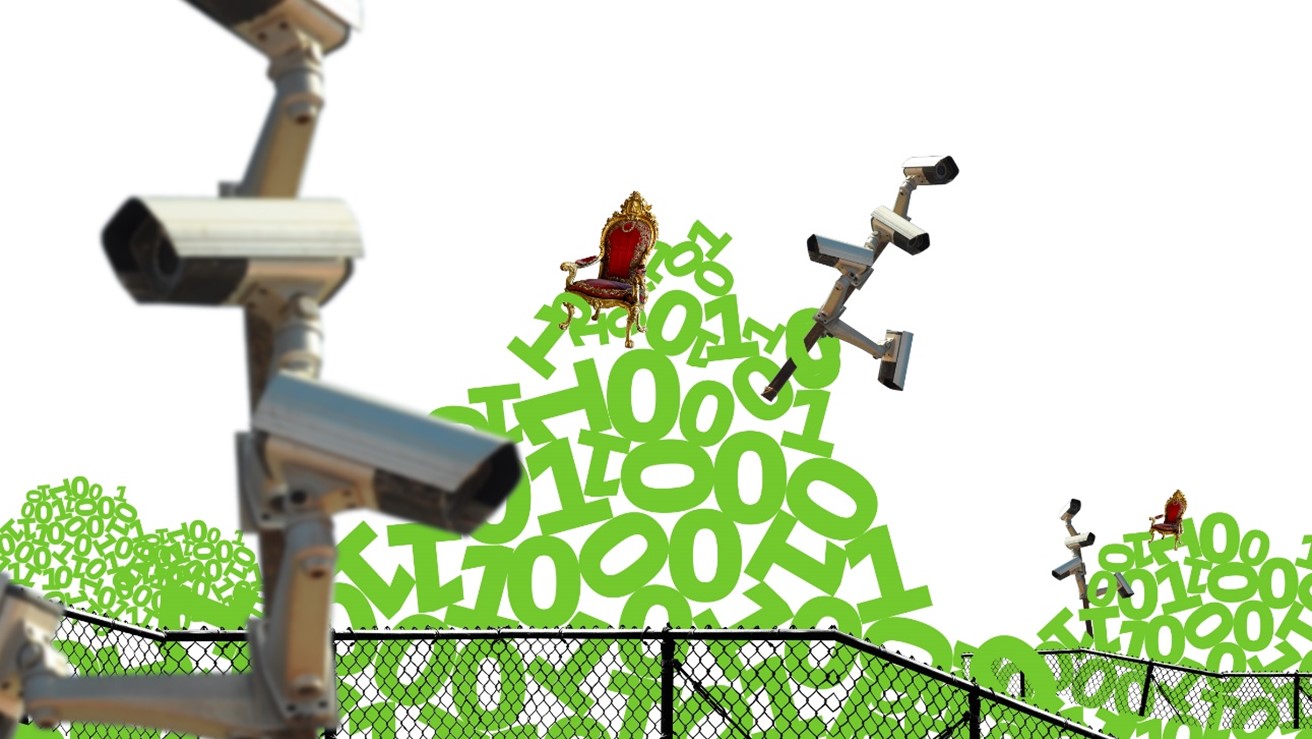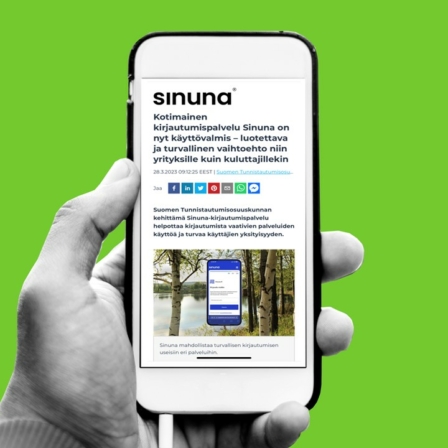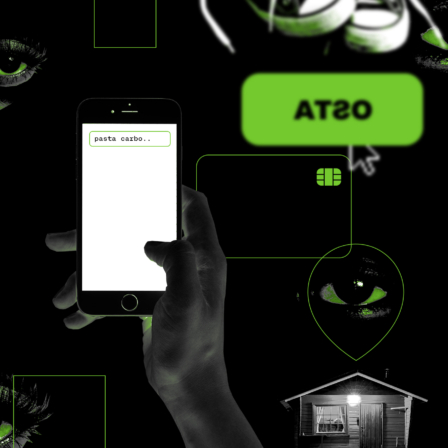Information obtained through data collection can prevent congestion, mitigate emissions and stop diseases from spreading, but people using digital services still have few opportunities for influencing. Legislation needs to be reformed – but this is no easy thing, according to the participants in the Digipower investigation.
Sitra’s Digipower investigation will coach 15 participants to submit subject access requests and use an app to monitor the digital behaviour of businesses and organisations that collect data about them, in order to discover who tries to influence them and how much. In this article, the first four test subjects to be announced tell us about their expectations for the project. The complete list of participating test subjects will be announced during November.
Part of their digital lives will be monitored with test phones given to them for the investigation, with a monitoring application installed.
For more details about the implementation of the investigation, see our Q&A article.
Miapetra Kumpula-Natri: “Data is like carbon dioxide – just as invisible, but also just as significant”
The online world should be just as safe as the offline world. It is not enough that users have good digital literacy, the environment also has to be safe – especially for young people, but equally for all others as well. This has to be controlled through legislation.
I use the internet and social media for communication, personal well-being and searching for data. My job is “on the move”. When I sit down, I read news, check where I need to go next, monitor my health with several applications and tell people about things on social media. The use of different platforms during work and leisure time overlaps. However, I try to put some leisure time aside and meet friends face to face.
I assume that a lot of data is collected about me, too. After the stricter requirements for obtaining consent came into being, I have noticed how much variation there still is when it comes to requesting consent. Just an enabled Wi-Fi connection and a whole host of different apps collect real-time information, wherever you are.
I am also looking forward to the European Commission’s data act, which will tell us a lot about who has access to data and what rules govern that access. The collection of data is often also a very positive thing: data can solve traffic congestion, mitigate emissions and prevent diseases from spreading, for example. However, how data is collected and managed needs to be regulated.
Data-driven influencing mainly brings to mind trolling, hacking and also targeted marketing. It has gone too far; after all, we wouldn’t approve of people peeking through windows or recording everything about us when we are walking around town, to then analyse the information and use it to target us with other information or products. Of course, there are also fair options out there so that you can, for example, offer a product or service in Finland and not South America or in Vaasa and not Helsinki. On the other hand, integrity and openness are also important, because many things still remain hidden from users even though those things concern them. When we are looking for information online, we do not want the browser to show us results targeting the content without our understanding it. Especially when young people are concerned, targeted information increases vulnerability.
A large volume of data is collected, and there must be clear-cut rules for its use. Moreover, it must not be so that all data streams ultimately end up in a single flow that goes to a large private corporation. Data is an important factor of production that needs a fair market. Also, data is a bit like carbon dioxide: politics, business and legislation are created around it. Both are equally invisible, but equally significant!
Atte Harjanne: “Centralising power, the data economy is transforming the world at a fast pace”
The internet is an integral part of all work and leisure time today. A very large share of my communication is routed over the web: email, social media, instant messaging services. For work purposes, email is perhaps the most common medium in daily life, while social media is essential as a way to keep in touch with the general public.
A member of parliament is at work to some extent almost all the time. The same social media platforms (Facebook, Instagram, Twitter) are used for both work and leisure, and the border between the personal and political is not always completely clear in today’s mediasphere.
I suspect that not everybody understands how enormous the volumes of user data are that are being collected and stored today. I might not, in reality, perceive it fully myself, either. The collection of data is nowadays a central part of the business logic of online services, and there is probably no chance of a return to the world as it was before. It would be essential for the user to have genuine power and a perspective on the collection and use of their own data.
The collection of data centralises a lot of new, frightening kinds of power based on data with individual companies. This is a potential risk. I think that conscious influence is nowadays connected to commercial interests: they want to sell me things. Of course, the content that a service wants to show me also shapes my view of the world and its state. It, too, is undoubtedly also guided by algorithms that maximise the use and addictiveness of services.
Legislation needs to be strengthened, but this is no easy thing. Legislation should simultaneously be up to date yet also universal so that it will not become immediately obsolete. In this subject area, we should absolutely make use of the EU’s muscles, but it does not exclude smart national regulation.
The data economy is centralising power and transforming the world at a rapid rate, and it would be important for democratic decision-making to be in the driving seat in this.
Anders Adlercreutz: “Everyone sees messages that they like and think that everybody else also sees the same”
The legislation on the collection and ownership of data is still very inadequate. An industry with an earnings logic understood by few users creates profiles of us and sells that data on. Little is known about the impacts, and there are few restrictions on activities. Consumers do not always know how the collected data is used, and how it is used for making money. I suspect that I will be surprised about the volume of data collected about me – although you always imagine you can see through digital attempts to influence you.
I mainly use the internet for following the news, but of course for all other things as well: I do some of my shopping and all my banking online. I also use social media quite a lot. Twitter is the most common platform for me to comment on, expound my views and discuss – which sometimes succeeds well, sometimes not. As a politician, however, I also try to present myself as a person, not always purely as a politician.
The collection of data inevitably leads to all of us being fed content that we like. This leads to bubbles. The news stream is controlled by algorithms, which will certainly also influence politics. Everyone sees messages that they like and think that everybody else also sees the same. How does it then influence our image of the world when only a single truth is offered? A message that is praised when conveyed by one politician would result in a storm of hate if I said the same thing.
Risks relating to the collection of data include personal integrity risks and disclosure of private matters and information, data breaches and financial crime. On the other hand, it is ultimately also an opportunity and a good thing that someone knows what you want. If you liked a movie on Netflix, you will be recommended another one to watch. You don’t have to ask all your friends for suggestions.
Jyrki Katainen: “At times, I feel like a silent partner not knowing how to manage my own data”
The collection and use of data in the digital world are good and laudable things as such. However, the management and collection of this data is troubling, especially since there appear to be no hard and fast rules. At times, I feel like a silent partner not knowing how to manage my own data.
I use the internet and social media in my leisure time, especially for following the news and media. At work, pretty much all the materials I use are digital. I use a range of digital channels and services for searching for and processing data in my work. I don’t use social media that much, but at times I use Twitter for communicating and searching for information.
I believe that data and the collection and use of data can have a significant impact on political and journalistic processes and activities. However, the impact does not need to be negative, as exemplified by targeted communication and advertising, for example. Social media algorithms that popularise forthright, provocative or even divisive opinions are an example of the negative aspects relating to the same phenomenon, and they cannot be controlled by individual people.
For the time being, there is very little legislation on the collection and ownership of data. The GDPR is naturally the best-known example of legislation, but it is still far from adequate and might cause undesired side effects for research, for example. For the time being, there are very few rules and standards for the use and control of data.
Data is the most rapidly increasing raw material, and there are a few trailblazer companies that have been better at using it. Now, the size of the pioneering companies contributes to a situation in which competition and new innovation are not emerging to a sufficient extent. Therefore, more rules are needed.
It should be possible to share and use data so that new innovation and business opportunities emerge. However, many companies also need more rules to give them the courage to share data.
So far, the negative aspects have dominated the discussion on influencing through data. Social media algorithms that reward aggression have been much discussed, for instance. But the use of data can also lead to good things: increased awareness and opportunities for influence, if the rules are clear. I believe that technology as such provides an excellent opportunity for increasing openness, engagement and awareness, but it does not work in an ideal way at the moment.
Social and digital media influence our thinking on a daily basis, sometimes distorting the truth. Sitra’s Digipower investigation tracks the journey of 15 leading influencers and their own data and shows what happens to their data and how data becomes power. The results of the project will be published in early 2022.













Read more